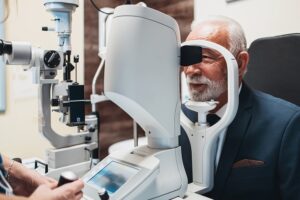How to Choose the Right Eye Care Practice
 Visual care plays an essential role in your overall well-being and quality of life. Not only can maintaining proper ocular health enable you to perform necessary activities (e.g. walking, reading, or driving) with greater ease, but regular exams and screenings can help diagnose serious ocular diseases such as cataracts and glaucoma as early as possible. Additionally, treatments for migraines, neuro-ophthalmic conditions, and other issues often fall under the umbrella of ocular care.
Visual care plays an essential role in your overall well-being and quality of life. Not only can maintaining proper ocular health enable you to perform necessary activities (e.g. walking, reading, or driving) with greater ease, but regular exams and screenings can help diagnose serious ocular diseases such as cataracts and glaucoma as early as possible. Additionally, treatments for migraines, neuro-ophthalmic conditions, and other issues often fall under the umbrella of ocular care.
That said, our skilled eye doctors – Tory Prestera, MD, PHD, and Kevin Garff, MD – believe that many factors should be considered when choosing an eye care practice. Before you book a consultation at any eye or vision care office, our doctors advise you to ask in-depth questions about the practice’s featured services and the qualifications of the physicians who work there. These questions can include:
- “Are you certified by the American Board of Ophthalmology (ABO)?” The ABO is one of the most prestigious organizations ever created for ophthalmologists, and certification is reserved for top eye doctors. To qualify, an eye doctor must undergo years of specialized training, acquire extensive knowledge of ocular anatomy, be proficient in a wide range of procedures, and consistently treat patients with integrity and compassion. When you enlist the help of a board-certified ophthalmologist, you increase your chances of an altogether more successful eye care experience.
- “Which services are available?” Top eye care practices typically offer the full breadth of visual services, from corneal transplants to comprehensive eye exams. With this in mind, you should always ensure that the ophthalmologist is able to treat your concerns. While the doctor does not necessarily need to specialize in your particular issue, they should be proficient in the surgery or treatment needed to address the problem.
- “Do you use current technology and proven surgical methods?” Ophthalmology is both a very complex and rapidly changing branch of medicine. Be sure to visit a practice that utilizes only up-to-date technology and techniques, such as Minimally Invasive Glaucoma Surgery (MIGS) and lasers to perform cataract surgery and other intensive procedures.
- “What do previous/current patients think?” Patient safety and satisfaction should be at the top of your eye doctor’s priority list. For a preview of their bedside manner and the potential results you can expect, you can explore their website or read testimonials from prior patients.
- “What are your financial and insurance options?” As the cost of eye care can vary between practices, it’s usually prudent to make sure the services you’re seeking are within your budget. We also recommend you check whether the practice offers your insurance, and because many leading eye doctors offer programs for eligible patients to pay for their care in installments, it’s often also worth it to ask the practice whether these plans are available.
In addition to the above, it is imperative that your eye care practice is trustworthy and communicative. Each member of the team, including ophthalmologists, nurses, and office staff, should welcome any questions that may arise about your care. Part of their job is to create a welcoming environment in order to allow you to feel comfortable and safe throughout your entire visit. Remember: as a patient, you are entitled to respect and transparent information about your care!
To schedule a first-time consultation with Dr. Prestera or Dr. Garff, please feel free to contact Prestera Eye Medical Group.